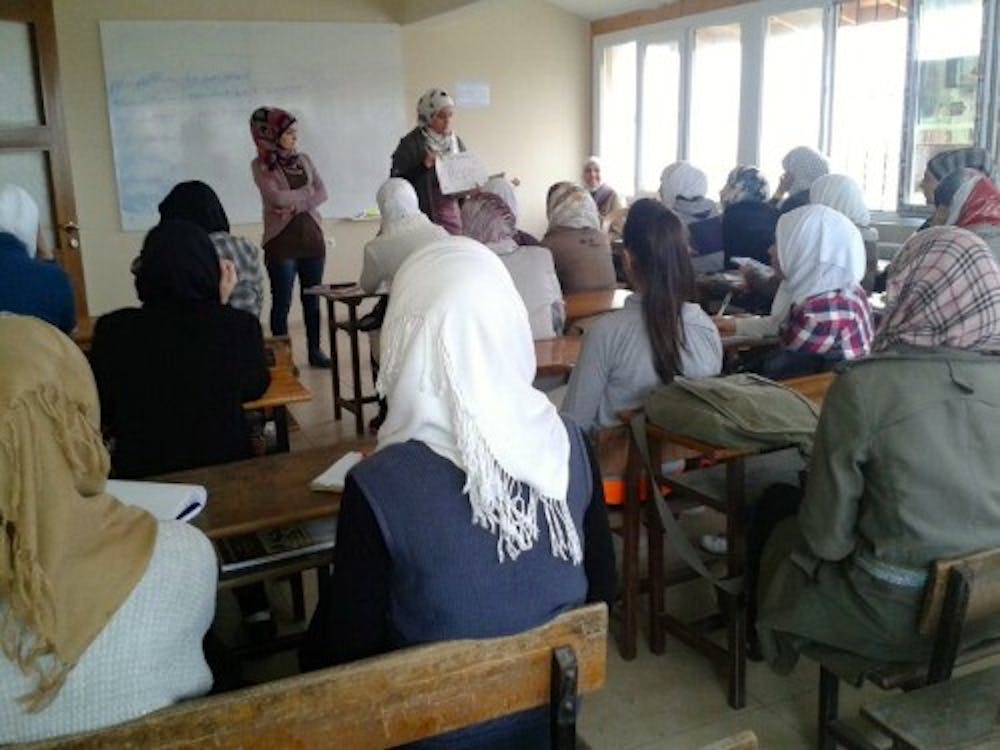Biochemistry and justice studies junior Zana Alattar said when she heard about the amount of executions the Islamic State group carried out, she realized how lucky she was to have made it out of Syria alive.
“If it was your story gone wrong, it could have been you who were captured by ISIS and killed,” she said.
Alattar travelled to Syria in November 2013 with an organization called Students Organize for Syria at ASU, to provide humanitarian relief to refugees in Syria.
“I went into Syria on a relief trip (from Turkey) with two doctors for Students Organize for Syria at ASU,” she said.
Alattar said the organization sponsored a school in Syria and brought supplies to families whose heads-of-household, usually the fathers, were killed in the Syrian Civil War.
The war, which began in 2011 with nationwide protests against Syrian President Bashar al-Assad, escalated after the Syrian government responded with violent crackdowns. This sparked a major shift in the war, developing from protests to an armed rebellion. As a result, more than 4 million civilians have been forced to abandon their homes.
“On the northern Syrian border with Turkey, there is a huge area of refugees,” she said. “People were trying to stay out of the area in Aleppo with the Assad regime. There were refugee tents with people living on the ground.”
Aleppo, Syria’s largest city, is the site of an ongoing, years-long battle between several rebel groups and Syrian Armed Forces and Hezbollah, a Shi’a Islamist militant group. Since the start of the battle in 2012, more than 31,000 civilians and soldiers have died.
“Further into the free, liberated cities are completely self-run,” Alattar said. “The Assad government cut off electricity and water from the liberated cities so (liberated citizens) had to find ways to generate electricity.”
Rebel soldiers make up organizations such as the People’s Protection Units and the Free Syrian Army. These groups have been continuously fighting to defend Syria and have successfully liberated several cities from the Assad regime.
Due to the amount of unrest in Syria, Alattar said they were not sure if they would be able to get in until they crossed the border.
“It was a huge adrenaline rush,” she said. “We were going into an area without rules under the Assad regime. There was nothing to tell people that what they are doing is wrong.”
During Alattar’s visit to Syria, a jihadist organization who call themselves the Islamic State of Iraq and Syria, was quickly rising to power throughout the Middle East.
“When we were going into Syria, ISIS was getting its feet on the ground. We actually passed through a border that ISIS controlled,” she said. “We knew that if something happens and you look at someone the wrong way, you could get captured by ISIS or Assad.”
Today, the Islamic State group has control over huge portions of Iraq and Syria, including the Syrian city of Raqqa, where it has declared its capital. They use violence and terror to capture cities and citizens to establish strongholds all over the Middle East. The organization made national headlines after publicly beheading an American hostage, James Foley.
Alattar said although her group travelled with soldiers from the Free Syrian Army, being in the presence of the Islamic State group was alarming.
“We knew going in that there was a presence of ISIS,” she said. “But you see it more once you’re in (Syria). There was also a presence of foreign fighters inside Syria that was concerning.”
Since the awareness of the Islamic State group has grown, many westerners have traveled or attempted to travel to the Middle East in hopes of fighting alongside the organization. Alattar said these people do not fully understand what the Islamic State group is doing.
“A lot of people in the U.S. are easily manipulated by ISIS’s propaganda and beliefs in general,” she said. “ISIS does not represent Islam. People have a false understanding about Islam and what ISIS is doing. Their ideology shouldn’t be supported.”
Alattar, who has family who live in Syria, said the Syrian people are now facing two enemies: the Islamic State group and the Assad regime.
“I have aunts and uncles and cousins who are living in bombed areas from the Assad regime,” she said. “The power is apparent.”
Alattar said she believes bombing the Islamic State group will not solve the problem until the Assad regime is stopped.
“(Bombing the Islamic State group is a) step in the right direction,” she said. “But bombing ISIS will not solve the issue. The issue rose out of the original problem, which was the Assad regime. (Stopping) ISIS is necessary, but is not entirely successful without eliminating the Assad regime.”
Because of the heightened awareness of Muslim extremist groups, some American citizens have developed an animosity toward Muslim-Americans, leading to violent attacks. In February 2015, three Muslim-Americans, Deah Shaddy Barakat, Yusor Mohammad Abu-Salha and Razan Mohammad Abu-Salha, were killed in their North Carolina home by their next-door neighbor in an apparent hate-crime attack.
“The Chapel Hill shootings are a perfect example of people’s perception of Islam,” Alattar said. “People are using ISIS to further solidify the violence towards Islam, but Muslims in the world are normal people, as we saw in the Chapel Hill victims. The ideology of ISIS is not Islam — period.”
Alattar said although the Islamic State group has grown in power, that should not stop the amount of humanitarian efforts provided to the Syrian people.
“People do it everyday, members of non-profits who go in to provide humanitarian efforts,” she said. “One group shouldn’t stop people from delivering aid. Going into Syria is always a risk and there is always hesitancy to provide aid because of the Assad regime and even more so because of ISIS.”
Reach the reporter at Jlsuerth@asu.edu or follow @SuerthJessica on Twitter.
Like The State Press on Facebook and follow @statepress on Twitter.





